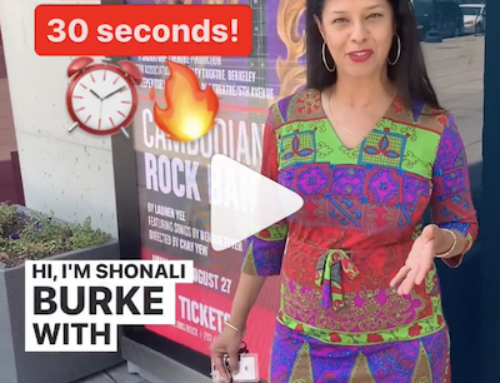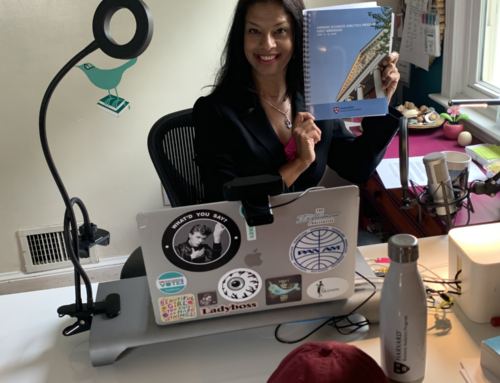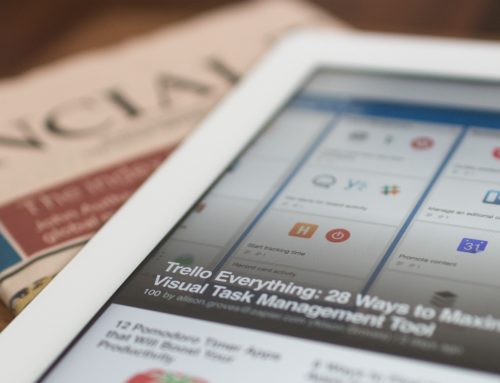Guest Post by Mike Doman
I recently had the pleasure of sitting on the admissions panel for a PR course.
In fact, it was my old PR course – RMIT University’s Bachelor of Communication (Public Relations). It was eye opening to say the least.
Having been there myself not too long ago, I was astounded by the sophistication of the graduates that applied – they were, to put it mildly, much more sophisticated than I was.
Image: Nick Fletcher via Flickr, Creative Commons
But I’m getting ahead of myself.
To land a position in the PR course at RMIT, students need to sit a test to ensure that they have the necessary general knowledge, writing skills and linguistic motivation to be a PR grad.
This, for successful applicants, turns into an interview (which is where I came in).
Being a young PR person, I was surprised that I was asked to sit on the admissions panel of three – made up of current practitioners-turned-academics – but probably not half as surprised as some of the interviewees (who probably thought I was more likely to field a call from my parents than from a journalist).
I was even more surprised at their knowledge of the profession, further cementing my view that being a PR professional is becoming more difficult, and the profession will only benefit from this competition.
I, unlike the other panelists, saw the graduates through a different lens.
I wasn’t looking at their ability to be in the course, but their competency in being a future colleague for the thousands of us that are out there.
Before I went in, I had a bit of a think as to the things that I would look for in a graduate (and therefore an applicant), and with the help of two friends in HR (@greg_savage and @LucyChisholm for the Twitterati), have compiled a list as to
the things I think will separate the good communicators from the industry reputation-soiling spin merchants that we are (unfortunately) more commonly represented as.
1. An ability to listen.
Anyone can talk, and to consider PR as a career, it’s almost a given that they are at least competent writers. Not as common is a genuine interest in the things around them.
My own ability to listen has given me story ideas, helped when dealing with journalists and been infinitely beneficial in pitch meetings.
One applicant, who I argued against having in the course, gave fantastic answers, was well spoken, but as soon as another person started to speak (including panelists) got glassy-eyed and stared at their nails.
Sure, the nails were pretty fascinating, but ignoring your peers is borderline unforgivable: how are you going to build relationships without listening?
Emotional intelligence is an integral quality that separates a passable PR from a great operator.
Whether we like it or not, social media is creeping into more and more of what we do.
Being across the various social mediums not only helps with building relationships, but emphasizes being concise in your messaging.
Think about Twitter with its 140 character limits, or Facebook with its 420 character statuses.
Show me that you can be witty, informative or interesting concisely, and you’ll have taken a big step towards impressing me.
One applicant spoke about an Australian ex-Prime Minister’s use of social media as a fundamental part of his election campaign in engaging young voters. That got a big “check” from me.
Image: Marc Benton via Flickr, Creative Commons
3. Know where you want to go and what’s involved.
In the year I applied, out of our group interview of 10, there were probably seven future fashion PRs, and three music PRs (I was the latter at the time).
The answers from this group of candidates were generally proceeded by a declaration of love for parties, air-kissing and champagne.
That’s not to say that these aren’t wonderful and integral parts of PR, and if it’s your passion I have nothing but encouragement for it.
But you have to show that you know that this part of the business entails much more than being in the bright lights; if anything, you’ll spend more time chained to your laptop than schmoozing celebs.
4. Show your USP.
As PRs, we’re constantly looking for an angle – find yours.
If you’re going into interview thinking you’re a mundane and pretty standard PR person, you’re going to come across as a mundane, pretty standard PR person.
If you can’t tell us (again, concisely) what separates you from the masses, we probably won’t see it.
And there are very few employers who want a standard PR person, when they have the opportunity to snag one who is creative and driven and can find an angle, even if it is in themselves.
5. Ego strength (not straight ego).
Show that you’re resilient, open to constructive criticism and have an ability to bounce back from disappointment.
As a bit of a test, I asked a rather curly question of an interviewee who seemed offended that I would suggest I knew more than she did.
Imagine that in a consultancy – a PR who is so precious about their work that they can’t accept the advice of their seniors!
Not to mention the consistent (and sometimes crushing as a junior) rejection from journalists you’ll get as you begin your career.
Everyone gets sick of a know-it-all, especially when they’re doing it wrong.
6. Applying creatively.
This one didn’t factor into the panel I was on, but it does warrant a mention.
A friend of mine (@JadanLoughran) applied for a bunch of jobs by sending a shoebox with an untied shoe and his resume in it.
Odd (and intriguing) until you read the note attached: “Getting a job straight out of university is like learning to tie your shoes. Can you help me tie my shoelaces?”
That sort of creativity gets you noticed.
Another good example from Australia was a journalist called Tom Cowie, who mounted a full social media campaign called Tom Wants A Job, complete with a transparent blog (with all the applications and rejection letters), Twitter handle and Facebook fan page.
He got coverage in The Australian (Oz’s biggest national newspaper) along with a number of different news outlets. He also got a job out of it.
The number of ways you can set yourself apart are far too numerous to mention in one post. Creativity is just one of the things you need in this industry to be an outstanding applicant in a sea full of unoriginal fish.
PR applicants and grads are a different breed of worker, and with the media fast approaching the terminal velocity for change, you need to be able to show that you can keep up.
(Many thanks to @greg_savage and @LucyChisholm for their input)
 Mike Doman is an Account Executive at Mulberry Marketing Communications in Melbourne, Australia. In between media calls and writing press-releases, he does the occasional guest lecture for RMIT and has guest-written for Australian publications including The National Times and Crikey.com.au, along with publishing his own (non-PR) blog, Sporadically Pensive. He has also sat on the admissions panel for RMIT’s Bachelor of Communication (Public Relations) and tweets about everything from Masterchef to media relations.
Mike Doman is an Account Executive at Mulberry Marketing Communications in Melbourne, Australia. In between media calls and writing press-releases, he does the occasional guest lecture for RMIT and has guest-written for Australian publications including The National Times and Crikey.com.au, along with publishing his own (non-PR) blog, Sporadically Pensive. He has also sat on the admissions panel for RMIT’s Bachelor of Communication (Public Relations) and tweets about everything from Masterchef to media relations.




![[EVENT]: PR Hacks for Small Biz (online)](https://shonaliburke.com/wp-content/uploads/2021/06/FB-Ad-1200x800-01-01-01-Copy-500x383.jpeg)






I really enjoyed reading this post. As a person transitioning into the PR field, I found your insights helpful and encouraging. It’s nice to know what things can (and maybe already do) set me apart from the masses.
Where are you transitioning from? And Bryce Keane (one of the other contributors to Waxing UnLyrical once said to me that “as soon as you start thinking about people in terms of column inches, you’ve lost it!” It’s one of the better pieces of advice that I’ve received about PR.
*There should be a “)” at the end of UnLyrical… I am *quite* obsessive about grammar…
Thanks for a thoughtful approach to pr; I appreciated your saying that humility counts. I’m with you–listening is what often points me to the best stories.
Absolutely! It’s annoying (and sometimes amusing) for my friends that I often will stop mid-conversation to find a pen and a piece of paper to write down a little burst of inspiration they’ve given me…
I think this post is beneficial to all PR practitioners, both new and established. So many times, people lose sight of fundamental skills such as the ability to listen. I also like the viewpoint you took of looking at the students as being a future colleague.
I think that’s how you *have* to look at it. In one case, one of the other panelists said they were going to let someone in, but after I asked whether they would work with the person, the answer was a resounding “Oh God no…” – needless to say it became pretty clear that if we were going to get the best students in, we had to think about more than their suitability for the coursework.
As a PR student I have been reading your blog for quite some time and found you articles interesting as well as helpful for my PR course.
I am now a ‘Follower’ of your blog. I have recently started writing my own blog about being a PR student as well as current affairs. I would really appreciate it if you would follow me at http://2plus2pr.blogspot.com/
Thanks
Great assessment, Mike! While I wasn’t a student of PR initially, I think it’s important to think outside the box of what is standard in order to stand out. I like your point about listening as a skill because that is an attribute that doesn’t get enough attention.
Agreed! While this isn’t a comprehensive list (by any stretch of the imagination), the ability to listen is so often overlooked, yet when I mention it to most people they agree that people waiting for their chance to talk is one of the most frustrating and annoying things that anyone can do, not just grads or potential colleagues.
Representing companies as their PR specialist is an extremely important job, I can see what you mean about not just the average applicants making the cut. There is always one company willing to hire the not so top notch applicant because of budget. Research is key when looking to add a PR company or when hiring an in house PR specialist.
I absolutely agree with you. One of the nicest (and scariest) things about social media is that it allows people to do more research than ever before, meaning we can scout out a good “cultural fit” to go with the ability and skills.
[…] This post was mentioned on Twitter by Shane Jacob, Job Hunting Online. Job Hunting Online said: How To Become A Public Relations Star | Waxing UnLyrical http://bit.ly/dS36Lp […]